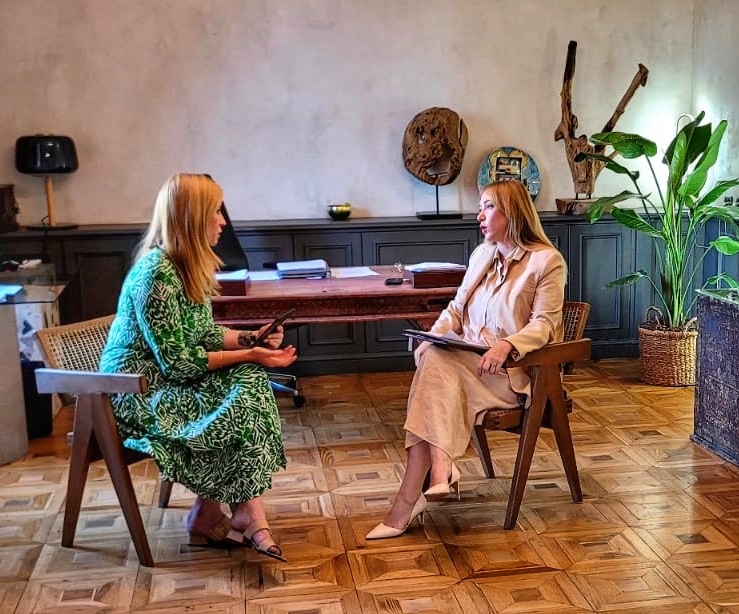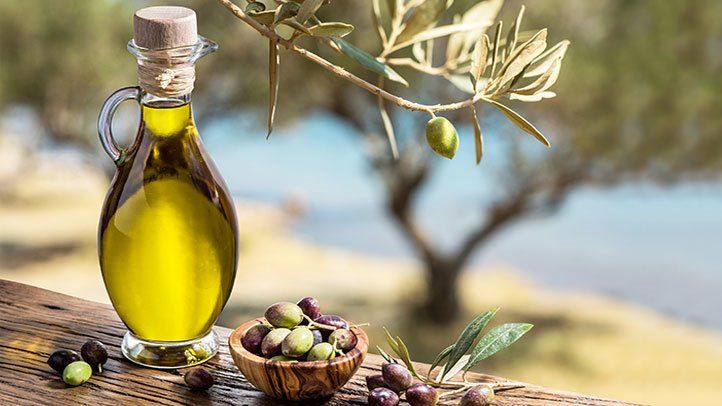As many Albanian youth migrate to big cities and abroad, and those that remain are not keen on working in agriculture, the Ministry of Agriculture is working hard to incentivise them to return to their roots, however for the EU hopeful, climate change remains the biggest challenge of all.
Albania has lost over 1.4 million citizens in the last 30 years, with up to 83% of youth wanting to study, work and live abroad. But the issue is not just migration out of the country, but migration from rural areas, to urban centres such as the capital of Tirana. For the country’s agricultural sector that contributes 18.63% of the GDP, and is yet to fulfil its full potential, this is a big obstacle.
In an interview with EURACTIV, Albanian Minister of Agriculture Frida Krifca explained that “migration is not a problem that only affects Albania or the agriculture sector. Today all the countries of the region are facing this phenomenon, as well as other European countries. We have been addressing this issue through different programs.”
One such example is a scheme where young people studying to be agricultural specialists receive a pay equal to the minimum wage (40,000 lek a month/ EUR 400) for the duration of the course. Additionally, those working in the public sector, including in agriculture, received a salary increase.
“But I believe that we should go beyond that. We have tried to show that agriculture is a profession which is changing, which is mechanised and offers professional satisfaction perhaps more than other professions,” said Krifca, who added that EU funds such as IPARD see young people prioritised in terms of developing their agricultural business ideas.
“We are encouraging young people to approach and see themselves as part of agriculture…more than 40% of applicants to received the grant are less than 40 years old,” she added.
Krfica also nodded at the agritourism sector as a great way to engage young people in agriculture, particularly those who do not want to work in manual jobs.
“Enormous effort has been made in funding, investing and facilitating in agritourist structures, which studies have shown, and we also believe, is the main instrument to raise employment, social inclusiveness and of course to raise the income of youngsters in the rural areas,” she said, adding that in 2017 there were just 10 certified agritourism sites, a figure reaching almost 300 today.
Albania is currently undergoing a tourism boom with visitor numbers up 60% on 2022 and expected to surpass 10 million by the end of the year. Agritourism is a central part of this as the country seeks to entice people through its scenery, diverse nature, and a long history of cultural, agricultural, and culinary traditions that are still preserved in many rural areas.
“I can guarantee you that this policy has reduced the impact of migration and has shown a successful way for our youth to invest and work in Albania. Without a doubt, we are constantly trying to combat this trend [of migration],” Krifca said.
Digitalisation
Farming in Albania is very rural and informal and the technologically-driven policies of the EU including AI, seem many miles away. But Krifca said progress is coming step by step and is being achieved by dangling carrots in the form of incentives and benefits.
“We have a small and fragmented agrarian structure that makes it difficult to apply new technologies that we find in other countries, therefore the national scheme of support in agriculture, among others, had as its objective the promotion of cooperation between farmers, which, because of the reminiscence of the history of our country, still remains difficult to apply.”
Albania was under totalitarian communist rule for nearly 50 years and farmers worked with the cooperative model which ultimately failed and saw vast swathes of the population plunged into starvation and malnutrition.
At a national level, the ministry has pushed for schemes where farmers grow separately but sell together, as a way to gently reintroduce the concept of working together.
But many farmers are also hesitant to register with the state. The government has therefore offered access to funding in return for registration, and as of 2023, there are more than 90,000 farmers registered with a VAT number, an increase of 14% from last year.
Funding up for grabs includes the National Support Scheme which has subsidised farmers expenditure and reduced cultivation costs for 39,000 hectares of wheat, 22,000 hectares of corn, and 23,000 hectares of fodder in 2022 alone.
It also supported the revival of the livestock sector to the tune of 850,000 livestock heads, and supported 308,000 beehives and some 1000 hectares of greenhouses.
For the 2023 scheme, over 68,000 applications have been received so far while in 2022, 48,7000 farmers benefitted from reduced fuel prices, feed, and services related to livestock, as well as lowered costs of getting certified as organic.
All of these applications were done online, giving a clear example of benefits available in return for formalisation and embracing digitalisation.
“So the process of formalizing farmers is moving in the right direction, showing that agriculture is another field that must necessarily rely on digitisation and the transmission of knowledge,” Krtifca said.
Albanian farmers can now also use a ministry-launched app, which gives real time information on markets, food analysis, active support schemes, financing, veterinary care, offers from agricultural pharmacies, legislation in force, and even land to rent.
“Do you know how many visits there were in 4 months? More than 2.1 million and all this information is accessible via a cell phone,” the minister stressed.
What makes Albania special
But Albania also has its sights set on several quality schemes, inline with EU regulations, the Geographical Indications, Designation of Origin, and Traditional Speciality Guaranteed- markers related to quality, geographical environment, tradition and origin of certain products.
The minister said there are four products registered in national schemes with the next step being their registration and protection in the EU. These include Mishavina e Bjeshkeve te Kelmendit cheese from Kelmend, honey of Bedunica from Permet, boiled cheese from Malesia e Madhe, and goats cheese from Diber.
“We have a list of 40 more excellent products that are being studied and will soon be registered as protected,” Krifca added.
She explained that quality products linked to a territory or traditional method are the foundation of efforts to strengthen the economic sustainability of farms in rural areas as local consumers are willing to pay up to 50% more for such items.
“This produces value but also a piece of nature, landscape, climate, soil, traditions and history of the area. We are fortunate to have extraordinary diversity of agricultural lands and microclimates and a diverse tradition of cultivating products, breeding livestock and processing them,” she said.
On the topic of trade with the EU and the possible removal of tarris and quotas on limited agro-commodities, Krifca said Albania has a preferential relationship for most products exported to the EU, while for a few items there are quotes, and for others, trade is liberalised with duty free access.
The EU remains the most important market for Albanian exports with more than $200 million in 2022, with this year set to top the last. While there are many requirements related to conditions of products, packaging, transport and food safety, the country is striving to “produce not only more, but better quality and safer products that meet the conditions of these markets.”
As for Open Balkan, the initiative between Albania, North Macedonia and Serbia to facilitate free-trade and movement, Krifca said “this served as a transitional phase for the opening and strengthening of economies until the moment the Berlin Process would take overas the umbrella platform of every regional initiative.”
She added that in 2022, exports to Serbia increased by 13.6% while imports fell by 20%, with similar successes noted in North Macedonia, due to the removal of previous bureaucratic obstacles.
“Through these agreements, we increased for 2022 by 94% the volume of cargo with the other two countries.
“By simplifying the procedures, we saved Albanian exporters 6,600 hours of waiting and procedures at the border, and more than 1 million kilometers of road for completing these documents,” she explained, adding this is sufficient to illustrate the success of the agreements brokered under the initiative.
But in terms of aligning with the EU aquis, Krifca describes it as a “complex process” involving the integration of EU legislation into Albanian law, but even more, the reform of institutions to ensure operation aligning with EU standards. This, along with the matter of common values, she said is more important right now than simply the funds that are available such as from CAP.
“In the case of agriculture, the membership process will be preceded by an effort by the agricultural sector to align with EU standards, and this journey for the modernisation of Albanian agriculture is even more important than the funds that Albanian agriculture will benefit from at the moment of membership,” she said.
But while this is underway, Krifca said the main challenge faced by Albania, is climate change which is directly impacting not just the territory but results in changing policies to adapt to production, land usage, irrigation and protection from floods.
According to IMF data, Albania will see a temperature increase of up to 2.2 degrees centigrade by 2050, along with increased frequency of extremely high temperatures. In addition, while precipitation is expected to decrease by up to 4.3%, the frequency and intensity of heavy rainfall would increase, posing more risks of flooding- something that already plagues the country every autumn and winter.
This combined with an increase in wild fires, creates a complex situation for the country.
“All of these challenges ask for us to put an extra effort in facing the new agricultural phase Albania has entered,” she said.
Follow The Balkanista!



